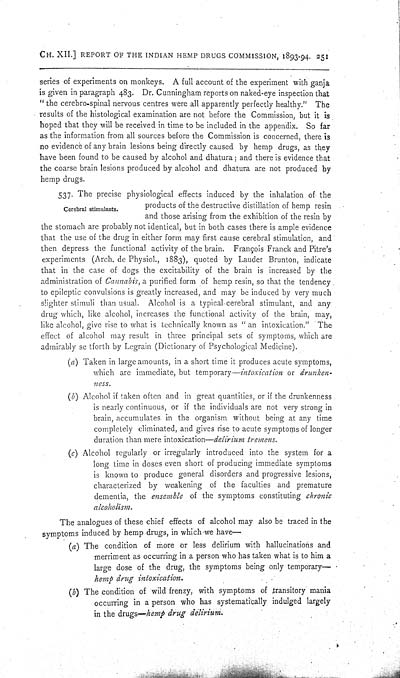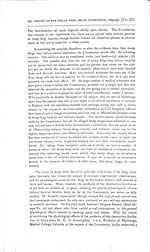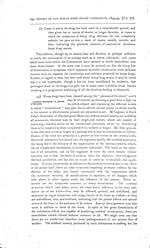Medicine - Drugs > Report of the Indian Hemp Drugs Commission, 1894-1895 > Volume I
(284) Page 251
Download files
Individual page:
Thumbnail gallery: Grid view | List view

CH. XII.] REPORT OF THE INDIAN HEMP DRUGS COMMISSION, 1893-94. 251
series of experiments on
monkeys. A full account of the experiment with ganja
is given in paragraph 483. Dr. Cunningham reports on naked-eye
inspection that
"the cerebro-spinal nervous centres were all apparently perfectly
healthy." The
results of the histological examination are not before the
Commission, but it is
hoped that they will be received in time to be included in the
appendix. So far
as the information from all sources before the Commission is
concerned, there is
no evidence of any brain lesions being directly caused by hemp
drugs, as they
have been found to be caused by alcohol and dhatura; and there is
evidence that
the coarse brain lesions produced by alcohol and dhatura are not
produced by
hemp drugs.
Cerebral stimulants.
537. The precise
physiological effects induced by the inhalation of the
products of the destructive
distillation of hemp resin
and those arising from the exhibition of the resin by
the stomach are probably not identical, but in both cases there is
ample evidence
that the use of the drug in either form may first cause cerebral
stimulation, and
then depress the functional activity of the brain. François Franck
and Pitre's
experiments (Arch. de Physiol., 1883), quoted by Lauder Brunton,
indicate
that in the case of dogs the excitability of the brain is increased
by the
administration of Cannabis, a purified form of hemp resin,
so that the tendency
to epileptic convulsions is greatly increased, and may be induced
by very much
slighter stimuli than usual. Alcohol is a typical cerebral
stimulant, and any
drug which, like alcohol, increases the functional activity of the
brain, may,
like alcohol, give rise to what is technically known as "an
intoxication." The
effect of alcohol may result in three principal sets of symptoms,
which are
admirably se tforth by Legrain (Dictionary of Psychological
Medicine).
(a)
Taken in large amounts, in a short time it produces acute
symptoms,
which are immediate, but temporary—intoxication or
drunken-
ness.
(b)
Alcohol if taken often and in great quantities, or if the
drunkenness
is nearly continuous, or if the individuals are not very strong
in
brain, accumulates in the organism without being at any time
completely eliminated, and gives rise to acute symptoms of
longer
duration than mere intoxication—delirium tremens.
(c)
Alcohol regularly or irregularly introduced into the
system for a
long time in doses even short of producing immediate symptoms
is known to produce general disorders and progressive
lesions,
characterized by weakening of the faculties and premature
dementia, the ensemble of the symptoms constituting
chronic
alcoholism.
The analogues of these
chief effects of alcohol may also be traced in the
symptoms induced by hemp drugs, in which we have—
(a)
The condition of more or less delirium with hallucinations
and
merriment as occurring in a person who has taken what is to him
a
large dose of the drug, the symptoms being only temporary—
hemp drug intoxication.
(b)
The condition of wild frenzy, with symptoms of transitory
mania
occurring in a person who has systematically indulged largely
in the drugs—hemp drug delirium.
Set display mode to: Large image | Zoom image | Transcription
Images and transcriptions on this page, including medium image downloads, may be used under the Creative Commons Attribution 4.0 International Licence unless otherwise stated. ![]()
| India Papers > Medicine - Drugs > Report of the Indian Hemp Drugs Commission, 1894-1895 > Volume I > (284) Page 251 |
|---|
| Permanent URL | https://digital.nls.uk/74574634 |
|---|---|
| Description | Chapter XII, cont. |
| Description | [Volume 1]: Report. |
|---|---|
| Attribution and copyright: |
|




